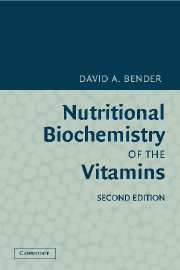Book contents
- Frontmatter
- Contents
- List of Figures
- List of Tables
- Preface
- 1 The Vitamins
- 2 Vitamin A: Retinoids and Carotenoids
- 3 Vitamin D
- 4 Vitamin E: Tocopherols and Tocotrienols
- 5 Vitamin K
- 6 Vitamin B1 – Thiamin
- 7 Vitamin B2 – Riboflavin
- 8 Niacin
- 9 Vitamin B6
- 10 Folate and Other Pterins and Vitamin B12
- 11 Biotin (Vitamin H)
- 12 Pantothenic Acid
- 13 Vitamin C (Ascorbic Acid)
- 14 Marginal Compounds and Phytonutrients
- Bibliography
- Index
5 - Vitamin K
Published online by Cambridge University Press: 03 December 2009
- Frontmatter
- Contents
- List of Figures
- List of Tables
- Preface
- 1 The Vitamins
- 2 Vitamin A: Retinoids and Carotenoids
- 3 Vitamin D
- 4 Vitamin E: Tocopherols and Tocotrienols
- 5 Vitamin K
- 6 Vitamin B1 – Thiamin
- 7 Vitamin B2 – Riboflavin
- 8 Niacin
- 9 Vitamin B6
- 10 Folate and Other Pterins and Vitamin B12
- 11 Biotin (Vitamin H)
- 12 Pantothenic Acid
- 13 Vitamin C (Ascorbic Acid)
- 14 Marginal Compounds and Phytonutrients
- Bibliography
- Index
Summary
Vitamin K was discovered in 1935 as a result of studies of a hemorrhagic disease of chickens fed on solvent-extracted fat-free diets and cattle fed on silage made from spoiled sweet clover. The problem in the chickens was a lack of the vitamin in the diet, whereas in the cattle it was from the presence of dicoumarol, an antimetabolite of the vitamin. It soon became apparent that vitamin K was required for the synthesis of several of the proteins required for blood clotting, but it was not until 1974 that Stenflo and coworkers (1974) elucidated the mechanism of action of the vitamin. A new amino acid, γ-carboxyglutamate (Gla) was found to be present in the vitamin K-dependent proteins, but absent from the abnormal precursors that circulate in deficiency. γ-Carboxyglutamate is chemically unstable and undergoes spontaneous decarboxylation to glutamate when proteins are hydrolyzed in acid for amino acid analysis.
Since then, a number other proteins that undergo the same vitamin Kdependent posttranslational modification, carboxylation of glutamate residues to γ-carboxyglutamate, have been discovered, including osteocalcin and the matrix Gla protein in bone, nephrocalcin in the kidneys, and the product of the growth arrest-specific gene Gas6, which is involved in both the regulation of differentiation and development in the nervous system, and control of apoptosis in other tissues. All of these γ-carboxyglutamate-containing proteins bind calcium, which causes a conformational change so that they interact with membrane phospholipids.
The impairment of blood clotting in response to antimetabolites of vitamin K has been exploited in two ways: the development of clinically useful anticoagulant drugs for patients at risk of thrombosis and, at higher doses, as rodenticides.
- Type
- Chapter
- Information
- Nutritional Biochemistry of the Vitamins , pp. 131 - 147Publisher: Cambridge University PressPrint publication year: 2003



